Balseros
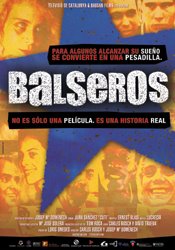 Balseros (Rafters)
Balseros (Rafters) (2002)
Drectors: Carlos Bosch, Josep Maria Domènech
Writers: Carlos Bosch, David Trueba
Synopsis: In the summer of 1994, a team of public television reporters filmed and interviewed seven Cubans, and their families, beginning a few days before their risky venture of setting out to sea in homemade rafts to reach the coast of the United States.
One of the balseros (rafters) was on a raft that was not seaworthy and had to return to Havana. The others made it far enough to be picked up at sea by the U.S. Coast Guard and taken to the North American naval base at Guantanamo, where the film crew caught up with them, and recorded their many months of confinement. Their families in Cuba had no news of them.
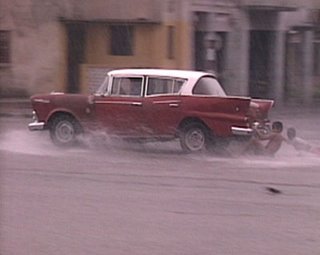
When the balseros were finally allowed to go to the United States, the film crew went with them to a string of cities that included Miami; the Bronx; York, Pennsylvania; Grand Isle, Nebraska; Albuquerque, New Mexico; and a host of other places to which the lives of these immigrants carried them. Seven years later, the film crew visits them again, to discover what their destiny has been in the United States. Theirs is a true story about some of the authentic survivors of our times, the human adventure of people who are shipwrecked between two worlds.
Cast:
Guillermo Armas .... Himself
Maria Celeste Arraras .... Herself (archive footage)
Rafael Cano .... Himself
Fidel Castro .... Himself (archive footage)
Bill Clinton .... Himself (archive footage)
Miriam Hernández .... Herself
Also Known As:
Cuban Rafters (Canada: English title) (International: English title)
Runtime: 120 min
Country: Spain
Language: Spanish
Color: Color
Sound Mix: Stereo
Sinopsis
En el verano del 94, un equipo de reporteros de Televisió de Catalunya filmó y entrevistó a siete cubanos y a sus familias durante los días en que preparaban la arriesgada aventura de lanzarse al mar para alcanzar la costa de los Estados Unidos huyendo de las dificultades económicas que asolaban su país. Algún tiempo después, en el campamento de refugiados de la base norteamericana de Guantánamo, los reporteros pudieron localizar a los que habían sido rescatados en alta mar. Sus familias permanecían en Cuba sin noticias de ellos, salvo en el caso de una mujer que había naufragado con su balsa y se había visto obligada a volver a territorio cubano. Siete años después de que se lanzaran a las aguas del Golfo de Florida en busca de un sueño, el equipo de "Balseros" se reencuentra con aquellos personajes para descubrir cuál ha sido su destino. Esta película retrata con detalle y sensibilidad su evolución, su vida en Estados Unidos o su permanencia en Cuba. La suya es la historia de algunos de los verdaderos supervivientes de nuestro tiempo, la aventura humana de unos náufragos entre dos mundos.
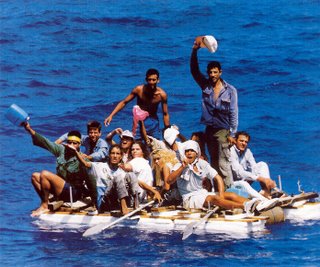 Referencias
ReferenciasEstá dirigida por el periodista Carles Bosch, que ha cubierto reportajes informativos para la televisión catalana en Guerra del Golfo, la de Bosnia y Kosovo y el cámara Josep Mª Domènech Graell.
El proyecto de realizar el largo surge a raíz de un reportaje para el programa 30 minuts de TV3 rodado en 1994 sobre los sucesos que provocaron que 50.000 cubanos se lanzaran en balsas al mar, espoleados por el confuso sueño de alcanzar las costas de Florida. Dicha locura no acabó hasta que quince días después de su inicio, los presidentes Castro y Clinton llegaron a un acuerdo por el cual Cuba "cerraba" todas sus costas.
Unos años después se hizo un seguimiento de la vida de siete de los balseros y en 2001 se concluyó la historia.
En el guión ha colaborado el director David Trueba
La banda sonora está escrita e interpretada por la cantante cubana Lucrecia.
Está filmada en vídeo y transferida a 35 milímetros con impresión láser.
Se rodaron mas de cien horas de imágenes.
Su presupuesto asciende a 770.000 euros.
Consiguió la candidatura al Goya 2002 al mejor documental.
Se presentó en el Festival de Cine de Sundance 2003.
Fue candidata al Oscar a la mejor película documental.
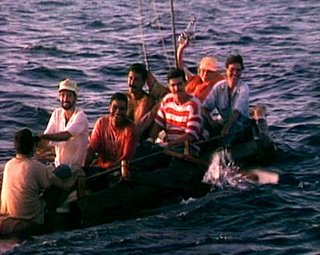
All critic scores are converted to a 100-point scale. If a critic does not indicate a score, we assign a score based on the general impression given by the text of the review.
100
The New York Times.- Dave Kehr
It remains a documentary at heart, full of astonishing glimpses of human resiliency that have nothing to do with artfulness and everything to do with patience, persistence and sympathy.
100
90
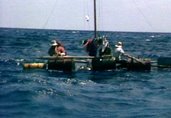 88
8880
75
70
60
An ambitious, smartly edited documentary epic by a pair of journalists who tenaciously followed their subjects over the course of seven years, the film is both intimate and sweeping.
50
50
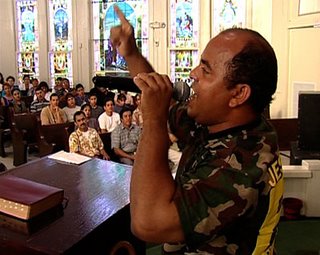
"Carles Bosch and Josep M. Domenech were in Havana from the beginning, documenting the refugees as they planned their escape with Castro's encouragement. The seven people they spotlighted become larger-than-life figures in "Balseros," a documentary that follows their journey from the waters off Cuba to U.S. detention in Guantanamo to residency in America. In the tradition of Michael Apted's "7 Up" series, "Balseros" is a seven-year time lapse that's full of drama, poignancy and some heartbreaking moments.
On one raft is Miriam Hernandez, who leaves behind her 13-month-old daughter. On another is Mericys Gonzalez, who works as a prostitute to pay for her boat. On another is Guillermo Armas, who is trying to reunite with his wife and daughter in Miami. Their stories (and resolve) are biblical. "We won't give up," one of them says.
But all of the balseros (which means rafters in Spanish) modify their dreams, and this is where "Balseros" really triumphs. Though these immigrants are the lucky ones who avoided watery mishaps and made it to U.S. soil, they still have to deal with the overwhelming pressure of starting life over in a country that's cruel to those without English skills and good jobs. Drugs and other temptations are everywhere. In a reflection of the trust the balseros had for Bosch and Domenech, they don't hesitate to talk about their low points -- or to be seen in trying situations.
"Balseros," which was nominated for an Oscar, is an intimate look at refugees who have names and children and the same dreams that all Americans have. Even though these former "boat people" are old news (in late 1994, Castro and the Clinton administration negotiated an agreement that ended their exodus from Cuba), "Balseros" makes us care more than ever about their continuing well-being.".........
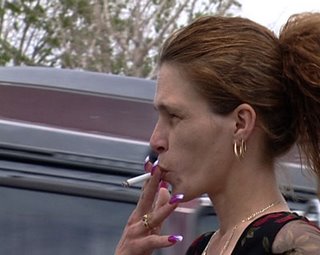
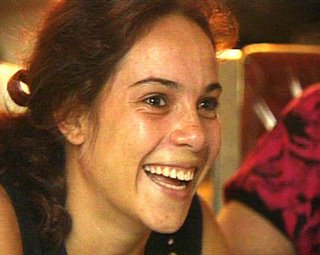
"The well-done documentary "Balseros (Cuban Rafters)," by Spanish TV reporters Carlos Bosch and Josep M. Domenech, tracks seven of the refugees, starting with their struggle to get enough money, often as little as $30, to build a rickety raft.
One woman was forced to sell her body. Another had to leave her young daughter behind.
"The only way out is to risk one's life at sea," a woman says.
Asked what he wanted in America, a man replies simply: "A house, a car, a good woman."
Those who made it far enough to be picked up at sea were confined for up to a year at Guantanamo, the U.S. Navy base on Cuba since made famous as a hellish detention site for people caught in the U.S. war on terrorism.
Once in the United States, the balseros (rafters) scattered to places as diverse as The Bronx and Nebraska.
Seven years later, the filmmakers visited the refugees again.
One woman had turned to drugs and confesses that she misses Cuba. Another refugee found comfort in religion. Others seem to have adjusted uneasily to life in the United States.
As for the woman forced to leave her daughter in Cuba, she continues to wait for the day when she will be joined by her child, now 8 years old."...........
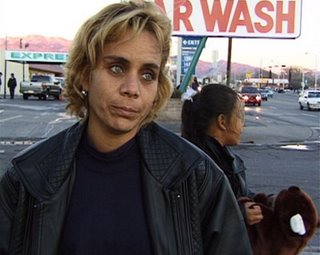

"The documentary is remarkable in how it personalized this human tragedy and provided an objective sense of the struggle involved, in not only the voyage but in those settling into a new culture they were all ill-prepared for. More than making a political statement, the filmmakers were interested in showing the ongoing struggle for freedom and how the Cubans cannot forget their homeland even as these simple folks are consumed with navigating the deep waters of the capitalistic society that offers so much but is so difficult to keep afloat in. It acts as another American immigrant story, but with many different twists and complications in a world that has changed greatly since the other great influxes of immigrants to America from Europe.".........
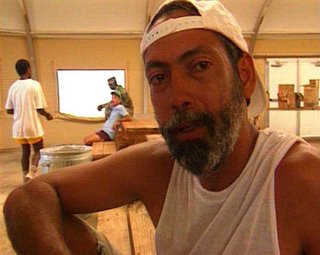 -----------------------------------------------------------------------------------------------------------------
----------------------------------------------------------------------------------------------------------------- La cantante Lucrecia nació en La Habana, Cuba y siendo muy niña ya se sentía atraída por todo aquello que tenía relación con la música. Con tan solo siete años comenzó a cursar estudios de música, licenciándose en la especialidad de piano en el Instituto Superior de Arte de Cuba. Para completar su formación, también recibió clases de canto.
La cantante Lucrecia nació en La Habana, Cuba y siendo muy niña ya se sentía atraída por todo aquello que tenía relación con la música. Con tan solo siete años comenzó a cursar estudios de música, licenciándose en la especialidad de piano en el Instituto Superior de Arte de Cuba. Para completar su formación, también recibió clases de canto.Participó como cantante y teclista en la orquesta Anacaona, con la que realizó giras por todo el mundo, hasta que llegó a España y se quedó a residir en Barcelona.
En 1993 participó en el festival internacional de boleros de La Habana, donde fue una de las artistas más destacadas. Ese mismo año fue finalista del concurso para seleccionar al cantante que representaría a Cuba en el festival de la OTI.
En 1994 edita su primer álbum "Me debes un beso" donde la producción y dirección musical fue realizada por ella misma. Su segundo disco "Prohibido" se edita en 1996 repitiendo la producción y dirección musical, de este disco se extrae la canción "La noche de la iguana" de Juan Pablo Silvestre, que sirvió de tema principal de la banda sonora de la película
 "Balseros". En 1996 se edita su tercer álbum, "Mis Boleros". Un año más tarde en 1997 publica "Pronósticos" y posteriormente en 1999 "Cubaname" donde Lucrecia una vez más, produce y dirige musicalmente su disco. De este disco se extrae la versión de la canción "Youkali" de Kurt Weill y Fernay, que sirvió de tema central de la película "Segunda Piel" dirigida por Gerardo Vera y protagonizada por Ariadna Gíl, Javier Bardem y Jordi Mollá.
"Balseros". En 1996 se edita su tercer álbum, "Mis Boleros". Un año más tarde en 1997 publica "Pronósticos" y posteriormente en 1999 "Cubaname" donde Lucrecia una vez más, produce y dirige musicalmente su disco. De este disco se extrae la versión de la canción "Youkali" de Kurt Weill y Fernay, que sirvió de tema central de la película "Segunda Piel" dirigida por Gerardo Vera y protagonizada por Ariadna Gíl, Javier Bardem y Jordi Mollá.
En 1999 interviene como actriz en la película "Ataque Verbal" dirigida por Miguel Albadalejo compartiendo reparto con Adriana Ozores, Antonia San Juan, Sergi López, Elvira Lindo y Antonio Resines, entre otros...
También en ese año se editó un single con gran éxito “Amparame”, que ahora se ha regrabado para su nuevo disco “AGUA” con un sorprendente resultado. En estos 2 años sin editar un álbum, Lucrecia ha descubierto nuevas facetas personales y musicales, ha realizando actuaciones y grabaciones de lujo junto a Chavela Vargas, Celia Cruz, Paquito D´rivera, Albita, Chano Lobato, Manzanita y Alex Acuña, entre otros…
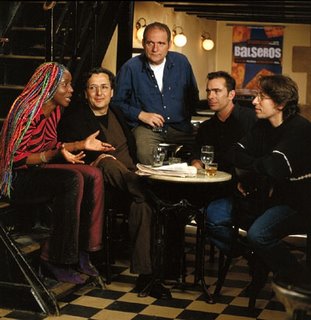
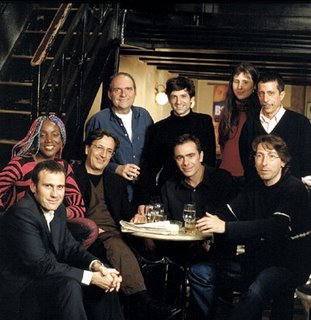
La maternidad le ha proporcionado un estado idóneo para la composición de la mayoría de los temas de su nuevo disco “AGUA". “AGUA" es evolución musical, virtuosismo vocal, frágil, alegre, sensual y fuerte. Si hay que enmarcarlo en un estilo musical digamos que es Acid Jazz latino ó mucho más sencillo es Lucrecia sin más!!! sigue fiel a su raíz cubana y a sus letras comprometidas, a su instinto.
En cuanto al repertorio, han sido varios meses de intenso trabajo, con una cuidadosa selección de canciones junto a Jesús N. Gómez, productor y director musical de este disco y uno de los mejores profesionales del país, con una amplísima carrera de éxitos, que sin duda ha hecho posible este trabajo, que sorprende por la exquisita selección de los 11 redondos temas que conforman el álbum. "Mi Gente" es la primera gota de agua, de este mar de emociones.

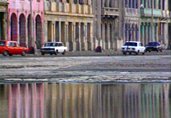

0 Comments:
Post a Comment
<< Home